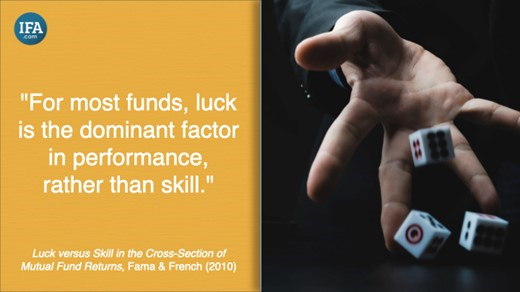— John "Mac" McQuown, quoted in Capital Ideas by Peter Bernstein (1992)
He isn't a household name, but very few people have made a bigger contribution to improving investor outcomes
than John
McQuown, known to friends and former colleagues as Mac, who has died at the age of 90.
It was at Wells Fargo in the late 1960s and 1970s, working alongside the likes of future Nobel laureates Eugene Fama and Robert Merton, that McQuown helped to develop the first index funds for institutional investors. He later co-founded Dimensional Fund Advisors, published numerous articles and research papers, and taught and mentored new generations of financial professionals.
But what really set McQuown apart from the other early pioneers of what we now call quantitative investing was, according to the FT's Robin Wigglesworth, his vision for applying scientific rigor to asset management. That vision, Wigglesworth wrote in Trillions, his highly-acclaimed book about the rise of indexing, was "revolutionary, laying the groundwork for the index funds that would eventually challenge the supremacy of active stock pickers."
Interestingly, Wigglesworth told me in an interview recorded after his death, McQuown set out, at the start of his career, with every intention of beating the market. What he discovered was that consistent outperformance was extremely difficult and that, when fund managers succeed in beating the market, it's generally down to chance, not skill.
"In his telling," Wigglesworth writes in Trillions, "the traditional approach followed a version of the Great Man theory first espoused by the 19th century philosopher Thomas Carlyle.
"Some preternaturally gifted hero would pick stocks that he thought would rise. When his touch inevitably deserted him at some point, the investor would simply transfer their hopes onto another Great Man."
Wigglesworth then quotes McQuown as saying Peter Bernstein's Capital Ideas, published in 1992: "The whole thing is a chance-driven process. It's not systematic and there is lots we still don't know about it and that needs study."
Are Successful Fund Managers Truly Skillful?
In fact, there've been numerous studies on this subject since Capital Ideas was published and the findings have been remarkably consistent. For example, in a 2010 study called Luck versus Skill in the Cross-Section of Mutual Fund Returns, the afore-mentioned Eugene Fama and his long-term collaborator Kenneth French found that only a small fraction of the managers they looked at appeared to achieve returns that were not merely due to luck. Those managers were, however, even fewer in number than would be expected by chance alone.

As well as the academic evidence on active fund performance, investors can also look to two highly-regarded industry scorecards. One is the SPIVA analysis provided by S&P Dow Jones Indices, and the other is the Active/ Passive Barometer from Morningstar.
These two scorecards have slightly different methodologies, but again their conclusions are broadly similar. Simply put, most active funds underperform their benchmarks most of the time, and although there are bound to be funds that produce eye-catching returns from time to time, such outperformance is usually short-lived.
The SPIVA U.S. Mid-Year 2024 scorecard has just been released. What it shows is that, over the 12-month ending June 30, active fund performance was rather better than average. So, for example, while 71% of all mid-cap funds underperforming the S&P MidCap 400, 57% of active large-cap U.S. equity managers underperformed the S&P 500 — more respectable though still worse than a coin flip. On the plus side, only 15% of all active small-cap U.S. equity managers underperformed the S&P SmallCap 600.
Crucially, though, this latest report confirms once again that underperformance rates have increased over time for both stock and bond funds, as the chart below shows. Over one, three and five years, there's a reasonable chance your chosen fund will outperform, but over 20 years the odds are stacked against you.
Picking Future Winners Is Very Challenging
A key point to remember is that there is always a vast array of funds for investors to choose from, but active funds tend to have a short shelf life. By closing funds which have underperformed, or by merging them with more successful funds, fund management companies are able to give the impression that their stockpickers possess genuine skill.
In fact, fund survivorship rates have fallen sharply in recent years. According to the Global Asset Management Report 2024 from Boston Consulting Group, only 37% of all funds launched in 2013 still existed by 2023. This is a significant decrease compared with 2010 when 60% of funds that had been launched a decade earlier were still in operation.
In other words, your chances of identifying a fund today that will still be around, say, 25 years from now, let alone a fund that will have outperformed its benchmark, are every slim.
Why Are We Still So Drawn To Big-name Managers?
Why, then, despite all this evidence, are people still so in thrall to the Great Man (or Woman) when it comes to investing their money? Why do so-called "star" managers like Cathie Wood, Bill Ackman, Jeff Gundlach, and David Einhorn, still attract such large inflows?
Behavioral experts have identified several in-built biases that help explain why this phenomenon persists. For example, we tend to attribute success and failure to people's traits or decisions rather than larger, more complex factors. We're drawn to people with strong convictions and charismatic or heroic characteristics. Investors also like the sense of control and certainty that using star managers gives them, particularly if they feel especially anxious about the economy or the stock market.
Perhaps the biggest single reason, though, why these managers remain so popular is that most of them are heavily promoted. We see their funds being advertised and discussed in the media, which appeals to our narrative tendency — in other words, our predilection for stories that are reassuring and seem to make sense of complexity.
Questions To Ask About "Star" Performers
Almost invariably, the funds we read about are those whose recent track records are the most impressive. After all, it's human nature to take notice if, say, a fund has doubled investors' money in just a few years.
But here are some questions you need to ask when you read about such a fund:
Does this fund manager possess genuine, repeatable skill?
Can I realistically expect him or her to repeat that success in the years to come?
In other words, is their recent performance statistically significant, as opposed to just plain lucky?
The answer to all of those questions is almost certainly No.
To quote Mark Hebner in Step 5 of book Index Funds: The 12-Step Recovery Program for Active Investors: "When managers are subjected to the scrutiny of a simple t-test [which measures statistical significance], the idea of manager skill to produce consistent alpha [or outperformance] quickly becomes relegated to the realm of fantasy."
Sadly, 50 years after John McQuown first drew attention to this fantasy, it remains just as seductive for us today as it was for investors then. Please don't be fooled by it.
IFA founder Mark Hebner wasn't just greatly influenced by Mac McQuown professionally — he was also a personal friend. Mark pays tribute to Mac in this recent video:
ROBIN POWELL is IFA's Creative Director. He always works as a freelance journalist and author, and as Editor of The Evidence-Based Investor.
*Quotes and pictures are utilized for illustrative purposes only and should not be construed as an endorsement, recommendation, or guarantee of any particular financial product, service, or advisor.
This is not to be construed as an offer, solicitation, recommendation, or endorsement of any particular security, product or service. There is no guarantee investment strategies will be successful. Investing involves risks, including possible loss of principal. Quotes and pictures are utilized for illustrative purposes only and should not be construed as an endorsement, recommendation, or guarangee of any particular financial product, service, or advisor. For more information about Index Fund Advisors, Inc, please review our brochure at https://www.adviserinfo.sec.gov/ or visit www.ifa.com.














